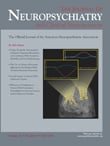To the Editor: Use of nonbenzodiazepine hypnotics has increased tremendously in the last few years because of the growing concern of benzodiazepine abuse liability.
1 Zolpidem is a short-acting imidazopyridine hypnotic that is an agonist at the GABA
A receptor. It has been suggested that zolpidem acts selectively on the alpha
1 subunit containing GABA benzodiazepine receptors and has low or no affinity for other subtypes.
2 Various studies initially concluded that it has low or minimal dependency risk.
3 However, zolpidem abuse and dependence has been frequently reported,
4,
5 commonly in patients with history of other substance dependence or with history of psychiatric disorders. The withdrawal from zolpidem and other newer hypnotics has been reported to be uneventful.
6 We wish to report a case of zolpidem dependence in a patient who developed delirium following withdrawal.
Case Report
A 62-year-old man presented with a history of violent and agitated behavior, restlessness, not recognizing others, irritability, and irrelevant speech for the previous 2 days. On examination, the patient was disoriented to time, place, and person, and he was uncooperative for examination. A diagnosis of delirium was made, and the patient was admitted. He revealed a 20-year history of migraine headaches and also reported sadness of mood, decreased interest, and disturbed biological functions for the previous 3 years. He was treated with tablet escitalopram, 10 mg/day, along with a tablet domperidone/ acetaminophen combination on an as required basis and tablet zolpidem, 10 mg at bedtime for sleep, around 2 years previously.
Subsequently, the history revealed that the patient would take zolpidem and would go to sleep. Gradually, over the next 6 months the patient increased the dose of zolpidem to 60 mg/day. He would not take other medicines at the same time. He would generally feel relief for about 2–3 hours after taking around 4 tablets (40 mg/day) of zolpidem. Three days prior to admission, the patient’s family members came to know that the patient was taking around 16–18 tablets (160–180 mg/day) of zolpidem. Subsequently, the patient was not allowed to take zolpidem. The patient developed the above-mentioned symptoms on the second day of stopping zolpidem treatment. Evaluations, including CBC, liver function tests, serum electrolytes, CT head scan, blood sugar, kidney function tests, urine analysis, ECG, and chest X-ray, were within normal limits. There was no history that suggested seizure disorder, other neurological illness, or history of other substance use. His personal and family histories were noncontributory.
A diagnosis of drug-withdrawal delirium (mental and behavioral disorders due to the use of sedatives or hypnotics [zolpidem], acute withdrawal with delirium) was made. The patient was started on 10 tablets of zolpidem, 100 mg/day, along with clonazepam, 2 mg/day. Gradually, the patient showed improvement in his symptoms of delirium, and his zolpidem and clonazepam were tapered over a period of 2 weeks. At this time, the patient reported that he would feel cravings for the drug, would feel relaxed and calm after taking the drug, and had gradually increased the dose over the last 1 and a half years. He fulfilled the criteria for zolpidem dependence. Subsequently the patient was started on tablet topiramate, 200 mg/day; paroxetine, 25 mg/day; and flunerazine, 10 mg/day, with improvement in headache and also in depressive symptoms. The patient has been maintaining well since then for a follow-up period of 1 year.
Discussion
Our patient developed delirium following an abrupt discontinuation of around 160–180 mg of zolpidem. We could not find any other reason for delirium. Moreover, the patient improved when he was restarted on zolpidem and it was gradually withdrawn. Reports of dependence of zolpidem have been increasing in the literature. The withdrawal symptoms commonly reported include apprehension, restlessness, irritability, insomnia, palpitations, and anxiety (not amounting to panic).
7,
8 Withdrawal is generally reported to be uneventful with newer nonbenzodiazepine hypnotics. The reports of serious withdrawal symptoms have been very few. We could find only one report of delirium secondary to zolpidem withdrawal.
9 Other reports have been related to intoxication delirium or delirium after a single dose of zolpidem.
7,
10Physicians should be cautious while prescribing the newer hypnotics. They should not be used indiscriminately. It would seem reasonable to apply the same caution to prescribing this drug that is applied to the benzodiazepines, and use should be limited to the short-term indications for which it is licensed. Prolonged use may result in gradual dependence on this drug and may lead to severe and complicated withdrawal.
Our patient had neurological illness in the form of migraine headaches and was an elderly male, which could have predisposed him to delirium. Detailed drug history, including both prescription and nonprescription drugs (e.g., over-the-counter medications or herbs) is important in patients presenting with delirium.

